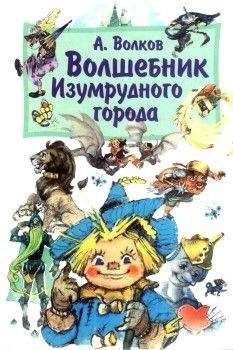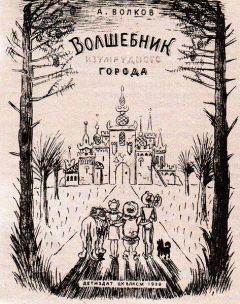Илья Франк - Английский язык с Ф. Баумом. Волшебник Изумрудного Города
"That would make me very unhappy (это сделало бы меня очень несчастной)," answered the china Princess.
"You see, here in our country we live contentedly (видишь ли, здесь, в нашей стране, мы живем довольные /жизнью/), and can talk and move around as we please (и можем говорить и гулять: «двигаться повсюду», как нам заблагорассудится). But whenever any of us are taken away our joints at once stiffen (но всякий раз, когда кого-либо из нас уносят, наши суставы немедленно деревенеют), and we can only stand straight and look pretty (и мы можем лишь прямо стоять и мило выглядеть).
mind [maInd], mantel [mxntl], contentedly [kqn'tentIdlI], stiffen [stIfn]
"Oh, I don't mind him a bit," said Dorothy. "But you are so beautiful," she continued, "that I am sure I could love you dearly. Won't you let me carry you back to Kansas, and stand you on Aunt Em's mantel? I could carry you in my basket."
"That would make me very unhappy," answered the china Princess.
"You see, here in our country we live contentedly, and can talk and move around as we please. But whenever any of us are taken away our joints at once stiffen, and we can only stand straight and look pretty.
Of course that is all that is expected of us (конечно, это все, что от нас и ожидают) when we are on mantels and cabinets and drawing-room tables (когда мы /стоим/ на каминных полках, в застекленных шкафчиках, или на столах в гостиной), but our lives are much pleasanter here in our own country (но наши жизни гораздо приятнее здесь, в нашей собственной стране)."
"I would not make you unhappy for all the world (я не сделаю тебя несчастной ни за что на свете)!" exclaimed Dorothy. "So I'll just say good-bye (поэтому я просто попрощаюсь)."
"Good-bye," replied the Princess.
They walked carefully through the china country (и они осторожно пошли по фарфоровой стране). The little animals and all the people scampered out of their way (маленькие животные и все жители быстро разбегались с их пути), fearing the strangers would break them (опасаясь, как бы чужеземцы не разбили их), and after an hour or so the travelers reached the other side of the country (и спустя час или около того путешественники добрались до другой стороны = противоположной части страны) and came to another china wall (и подошли к еще одной фарфоровой стене).
cabinet ['kxb(I)nIt], drawing-room ['drO:INru(:)m], scamper ['skxmpq]
Of course that is all that is expected of us when we are on mantels and cabinets and drawing-room tables, but our lives are much pleasanter here in our own country."
"I would not make you unhappy for all the world!" exclaimed Dorothy.
"So I'll just say good-bye."
"Good-bye," replied the Princess.
They walked carefully through the china country. The little animals and all the people scampered out of their way, fearing the strangers would break them, and after an hour or so the travelers reached the other side of the country and came to another china wall.
It was not so high as the first, however (однако она не была такой высокой, как первая), and by standing upon the Lion's back (и, встав на спину Льва) they all managed to scramble to the top (им всем удалось вскарабкаться наверх). Then the Lion gathered his legs under him and jumped on the wall (затем сам Лев поджал лапы: «собрал свои лапы под собой» и прыгнул на стену); but just as he jumped (но, когда он прыгал), he upset a china church with his tail and smashed it all to pieces (он опрокинул фарфоровую церковь своим хвостом и разбил ее вдребезги: «всю на кусочки»).
"That was too bad (это очень плохо)," said Dorothy, "but really I think we were lucky (но, на самом деле, мне кажется, что нам повезло) in not doing these little people more harm than breaking a cow's leg and a church (что мы не причинили этому маленькому народцу больше вреда, чем отломанная коровья нога и /разбитая/ церковь). They are all so brittle (они все такие хрупкие)!"
"They are, indeed (это уж точно, они такие)," said the Scarecrow, "and I am thankful I am made of straw (и я доволен, что сделан из соломы; thankful — благодарный; довольный /чем-либо/, радующийся /чему-либо/) and cannot be easily damaged (и меня трудно повредить; damage — вред, повреждение; to damage — повреждать, портить; повредить, ушибить). There are worse things in the world than being a Scarecrow (есть вещи и похуже в этом мире, чем быть пугалом)."
scramble [skrxmbl], church [tSq:tS], brittle ['brItl], easily ['i:zIlI]
It was not so high as the first, however, and by standing upon the Lion's back they all managed to scramble to the top. Then the Lion gathered his legs under him and jumped on the wall; but just as he jumped, he upset a china church with his tail and smashed it all to pieces.
"That was too bad," said Dorothy, "but really I think we were lucky in not doing these little people more harm than breaking a cow's leg and a church. They are all so brittle!"
"They are, indeed," said the Scarecrow, "and I am thankful I am made of straw and cannot be easily damaged. There are worse things in the world than being a Scarecrow."
21. The Lion Becomes the King of Beasts (лев становится царем зверей)
After climbing down from the china wall (спустившись с фарфоровой стены; to climb — взбираться, влезать, карабкаться; to climb down — слезать) the travelers found themselves in a disagreeable country (путешественники оказались в неприглядной стране; agreeable — приятный, милый; disagreeable — неприятный, противный), full of bogs and marshes and covered with tall, rank grass (изобилующей болотами и топями, заросшими высокой травой: «покрытыми высокой буйной травой»; to cover — покрывать, накрывать; покрывать, распространяться, расстилаться; rank — буйный, пышный, роскошный /о растительности/). It was difficult to walk without falling into muddy holes (было сложно идти, не падая в грязные ямы; mud — грязь, слякоть; hole — дыра, отверстие; яма), for the grass was so thick that it hid them from sight (потому что трава была настолько густой, что она скрывала их из виду; to hide — прятать, скрывать). However, by carefully picking their way (однако, тщательно выбирая путь; to pick — собирать, снимать /плоды/; выбирать, отбирать; to pick one's way — выбирать дорогу), they got safely along until they reached solid ground (они благополучно продвигались /вперед/, пока они не достигли твердой почвы). But here the country seemed wilder than ever (но здесь страна казалась еще более дикой, чем когда-либо), and after a long and tiresome walk through the underbrush (и после долгой и утомительной прогулки через подлесок) they entered another forest (они вошли в другой лес), where the trees were bigger and older than any they had ever seen (где деревья были больше и старше, чем те: «какие-либо», которые они когда-либо видели).
disagreeable ["dIsq'gri:qbl], bog [bOg], marsh [mQ:S], muddy ['mAdI], underbrush ['AndqbrAS]
After climbing down from the china wall the travelers found themselves in a disagreeable country, full of bogs and marshes and covered with tall, rank grass. It was difficult to walk without falling into muddy holes, for the grass was so thick that it hid them from sight. However, by carefully picking their way, they got safely along until they reached solid ground. But here the country seemed wilder than ever, and after a long and tiresome walk through the underbrush they entered another forest, where the trees were bigger and older than any they had ever seen.
"This forest is perfectly delightful (этот лес совершенно восхитителен)," declared the Lion, looking around him with joy (заявил Лев, осматриваясь с радостью /по сторонам/). "Never have I seen a more beautiful place (никогда я не видел более прекрасного места)."
"It seems gloomy (он кажется мрачным)," said the Scarecrow.
"Not a bit of it (нисколько)," answered the Lion. "I should like to live here all my life (я бы хотел прожить здесь всю свою жизнь). See how soft the dried leaves are under your feet (посмотри, какие мягкие сухие листья под ногами) and how rich and green the moss is that clings to these old trees (и какой густой и зеленый мох покрывает эти старые деревья; rich — богатый; обильный, густой; to cling — прилипать, цепляться, держаться). Surely no wild beast could wish a pleasanter home (конечно, ни один дикий зверь не может желать дома приятнее)."
"Perhaps here are wild beasts in the forest now (возможно, здесь уже живут дикие животные в этом лесу)," said Dorothy.
delightful [dI'laItful], gloomy ['glu:mI], moss [mOs], cling [klIN]
"This forest is perfectly delightful," declared the Lion, looking around him with joy. "Never have I seen a more beautiful place."
"It seems gloomy," said the Scarecrow.
"Not a bit of it," answered the Lion. "I should like to live here all my life. See how soft the dried leaves are under your feet and how rich and green the moss is that clings to these old trees. Surely no wild beast could wish a pleasanter home."
"Perhaps there are wild beasts in the forest now," said Dorothy.
"I suppose there are (полагаю, что живут)," returned the Lion, "but I do not see any of them about (но я не вижу ни одного из них поблизости)."
They walked through the forest until it became too dark to go any farther (они шли по лесу, пока не стало слишком темно, чтобы идти дальше). Dorothy and Toto and the Lion lay down to sleep (Дороти, Тото и Лев прилегли поспать), while the Woodman and the Scarecrow kept watch over them as usual (тогда как Дровосек и Страшила несли караул = охраняли их, как обычно).
When morning came, they started again (когда наступило утро, они снова отправились в путь). Before they had gone far they heard a low rumble (до того, как они ушли далеко = не успели они уйти далеко, как они услышали глухой гул; rumble — громыхание, грохот, гул), as of the growling of many wild animals (похожий на рычание множества диких животных).
dark [dQ:k], rumble [rAmbl], growling ['graulIN]
"I suppose there are," returned the Lion, "but I do not see any of them about." They walked through the forest until it became too dark to go any farther. Dorothy and Toto and the Lion lay down to sleep, while the Woodman and the Scarecrow kept watch over them as usual.
When morning came, they started again. Before they had gone far they heard a low rumble, as of the growling of many wild animals.
Toto whimpered a little (Тото тихо заскулил; to whimper — хныкать, ныть; скулить /о собаке/), but none of the others was frightened (но никто из остальных /путешественников/ не испугался), and they kept along the well-trodden path (и они шли по хорошо протоптанной тропинке; to tread — ступать, шагать; протаптывать) until they came to an opening in the wood (пока не добрались до просеки в лесу; opening — отверстие, щель; вырубка в лесу, просека, прогалина), in which were gathered hundreds of beasts of every variety (где собрались сотни зверей всех видов; variety — многообразие, разнообразие; вид, разновидность). There were tigers (там были тигры) and elephants (и слоны) and bears (и медведи) and wolves (и волки) and foxes (и лисы) and all the others in the natural history (и все другие /животные, известные/ в естествознании; natural — естественный, природный), and for a moment Dorothy was afraid (и на какое-то мгновение Дороти испугалась). But the Lion explained that the animals were holding a meeting (но Лев объяснил, что животные проводили собрание; to hold — держать; провести, устроить, организовать /мероприятие/), and he judged by their snarling and growling (и что, судя по их рычанию и ворчанию, он /пришел к выводу/; to judge — судить, выносить приговор; составлять мнение /о чем-либо/, делать вывод) that they were in great trouble (что они были в большом затруднении).


